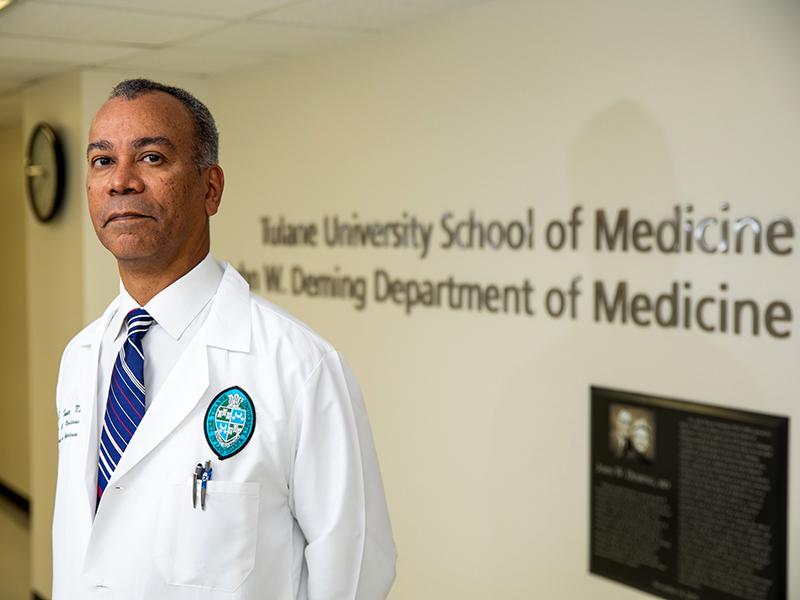New nephrology chief takes aim at homegrown hypertension
It’s no surprise that New Orleans — a city known for fried seafood, spicy crawfish and world-class gumbo — is a culinary capital of the South. But all of that flavor may come with a price.
The city has some of the nation’s highest rates of chronic kidney disease and high blood pressure. Diet plays a significant role in that, particularly high salt intake, said Dr. Robert Hoover, the newly appointed section chief of Nephrology and Hypertension in the Deming Department of Medicine at Tulane University School of Medicine.
“Obviously we eat very well down here, but sometimes there are some negative health consequences of that,” Hoover said. “High blood pressure and chronic kidney disease are much more prevalent here than they are throughout the country. About one third of the adult population in the United States has hypertension, but in Louisiana about 40 percent of adults have it. We have the sixth highest rate of hypertension in the country, so it's absolutely critical that we utilize the latest cutting-edge treatments for kidney disease and hypertension in New Orleans.”
Hoover, who joined Tulane in July, is focused on enhancing the section’s training and research initiatives while improving patient care. The program, which includes extensive clinical training in outpatient and inpatient facilities in New Orleans, has produced more than 75 nephrology and hypertension specialists.
Each year, more than 7 million deaths annually can be linked to high blood pressure. Both are complicated diagnoses that, if left unchecked, can cause life threatening conditions.
“High blood pressure is the single risk factor that contributed the most to worldwide mortality according to a study by the World Health Organization,” Hoover said. “It leads to strokes, heart attacks, congestive heart failure and chronic kidney disease over time because of high salt intake. Some of my favorite foods are high in salt but there are several things that all of us can do to offset the effect that salt has on our body like regular exercise, eating fruits and vegetables as well as eating foods that are high in potassium, which counteract the side effects of consuming too much salt.”
Hoover, a board-certified doctor in internal medicine and nephrology, has been helping patients fight high blood pressure and kidney disease for more than 30 years. His training includes an internship and internal medicine residency at Emory University, along with fellowships at Brigham & Women’s Hospital/Harvard Medical School and Vanderbilt. Before joining Tulane, Hoover was an associate professor of medicine in the division of renal medicine at Emory University School of Medicine in Atlanta.
At Tulane, Hoover says mentoring and empowering residents and fellows will be one of his key priorities.
"We want fellows who believe in excellence. We want enthusiasm. We want people to be excited about coming to Tulane and the practice of nephrology,” Hoover said. “We want them to be excited about the opportunities that we have here — and the opportunities that we have to save lives here. Educating the next generation of fellows who are going to lead nephrology into the future is a critical component of what we do as an academic medical center.”
As an active and experienced mentor to medical students, Hoover has guided many graduate students and research post-docs to successful careers. He also spearheaded community outreach efforts in the Atlanta area that focused on wellness education, specifically high blood pressure.
Raising awareness about the long-term consequences of uncontrolled hypertension and chronic kidney disease is a challenge as many people do not seek regular treatment and many cases are undiagnosed. Identifying these patients and getting them into regular care to manage their symptoms will have an enormous impact.
“As physicians, that's kind of always our purpose, right? How can we save more lives? How can we have a greater impact on patients' lives? We have a fantastic opportunity to maximize the care of patients and save as many lives as possible,” Hoover said “We do that through research, producing new therapies that are going to save lives. We do that through using the latest therapies that have already been approved and making sure that our patients are on those medications. And we do that by educating the new generation of fellows, the new generation of nephrologists who are going to lead us into the future. By doing all three of these missions, we can maximize our impact on patient care and save lives.”
Hoover, a California native, received his bachelor’s degree in chemistry magna cum laude from Howard University in 1987 and his MD from UCLA in 1991. He’s the chair of the American Heart Association (AHA) Council on Hypertension SCILL committee, a member of the AHA national SCILL committee, and the AHA Council on the Kidney in Cardiovascular Disease (KCVD) Nominating Committee. He is also a member of the American Society of Nephrology (ASN) Workforce and Training Committee.

